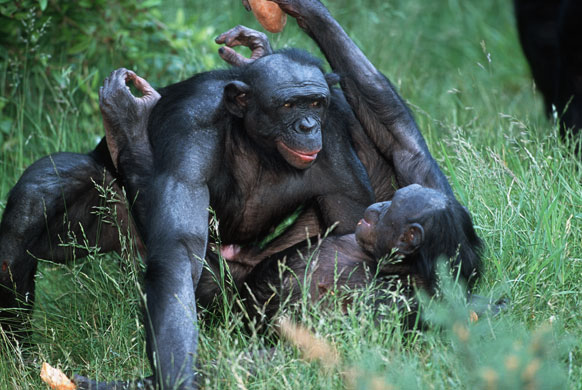In order to feel pleasure you need a neural network. Monkeys definitely feel pleasure - just watch a group of Bonobos, their life is one big orgy!!!!
Let's Talk About Sex
by cofty 96 Replies latest watchtower beliefs
-
-
cantleave
Couldn't resist adding a photo of a couple of bonobos
-
KateWild
Ahhh ok so anything with a brain. Lets look at the seagul sized dragonfly that evolved before the earths atmosphere was as follows
The dragonfly had pleasure mating, now that wasn't "recent" was it? The evolutionary process cannot negate the evolution of pleasure. Mating is more fun where there is pleasure and God evolved us this way. I rest my case. Sam xx
-
jgnat
Lock up your daughters.
http://www.stlyrics.com/lyrics/thebigchill/timeoftheseason.htm
-
cantleave
Yes Kate - in terms of evolutionary history the Carboniferous period is still recent (a mere 300 Million years).
-
KateWild
Well as soon as the brain evolved so did pleasure, and sexual reproduction. God played a part in this. Sam xx
-
cofty
So from the OP, organisms that reproduce by cloning rather than by sex suffer from the gradual accumulation of detrimental mutations known as Muller's Ratchet.
Potentially beneficial mutations tend to be invisible to natural selection because they are stuck in chromosomes beside "bad" genes - "selective interference".
If they are sufficiently beneficial to be selected for, they have to carry their neighbours with them, and they tend to eliminate competing versions of the same gene leading to a drastic reduction in genetic variety in the population - "selective sweep".
Sex overcomes this difficulty.
Its easy to imagine that it is the duplication of our chromosomes that is we key to the success of sex. Our cells contain 2 copies of each of 22 of our chromosomes, inherited from our mother and our father. In addition we have either 2 X chromosomes or an X and a Y depending on our gender. The corresponding chromosomes, numbered 1-22 by size, are very similar but not identical. They can cover for each other with a "good" copy of a gene masking the effects of a "bad" copy on the other copy of the chromosome. It turns out this is not the point of sex after all.
Studies of the asexual bdelloid rotifer by Natalia Pouchkina-Stantcheva from Cambridge University has revealed a surprising result. A sexual species of rotifer have gene pairs that are 96.7% identical. In the asexual variety the difference was a massive 14%. Daughters - there are no sons - inherit both copies of their chrmosomes in tact from their mothers, and those chromosomes are the free to go on mutating in splendid genetic isolation from their partner. There is an amazing example of how this benefits the rotifer that we can come back to later.
The point is that it is not the existence of chromosome pairs from two parents that is the advantage of sex.
The really important part of sex from the perspective of evolution is meiosis - from the Greek "to lessen".
Our sex cells are different from our somatic cells in that they contain only 1 set of chromosomes. The power of sex is in the way that 2 copies become 1.
Firstly the pair of chromosomes in the cell is doubled to make 4. Then they are snipped into sections and recombined to make 4 new chromosomes that are absolutely unique. Imagine having 4 copies of the same book - only the books are not identical, just very similar. You take a pair of scissors and cut the first 12 pages out of book 1. Then you remove pages 13 to 17 from book 2 and stick these together. You continue this process for the entire length of the book creating two new books that are both different from the originals. Meiosis does something very like this, except it does two at a time creating 4 new unique sex cells each containing 1 set of chromosomes from one orignal cell.
This is the key process that overcomes the limitations of cloning; selective interference, and the loss of diversity, selective sweep.
Advantageous mutations are no longer doomed to stay shackled to neighbouring genes regardless of their fitness. The whole deck gets reshuffled time and time again.
Thanks to Cantleave and others who said a lot of this already.
So when did sex evolve and what were the pressures that led to its invention?
tbc...
-
prologos
do plants have neural capacity? I remember a flower, plant that folds leafs within a second of being touched, how about carniverous "snapping" plants?
if they can sense that, sex is more pleasurable than eating , certainly being eaten.
To me it appears all growth is pleasurable, like the itch one experiences as our teenage members, (legs, arms, I mean) grew, one spurt at a time.
-
cantleave
The venus fly trap does not have a nervous system.
When a victim enters the modified leaf of the flytrap it stimulates hairs on the leaf's interior surface - called trigger hairs and they act as motion senors for the plant. If two of these hairs are touched or one hair is touched twice, the leaves closes down on the prey - and pretyy quickly too, in less than 0.5 of a second.
How this occurs is not fully understood but what is known is the cells in an inner layer of the leaf are very compressed, creating tension in the plant tissue that holds the trap open. The stimulation of the trigger cells activates a change in the water pressure within these cells (during this process energy is created by the well known ATP -- ADP chemistry) The cells expand by the increasing water pressure, the plant tissue relaxes and the trap closes.
-
DeWandelaar
Guys and Gals... you all deserve a medal!
This is probably the most boring topic about sex EVER :D

